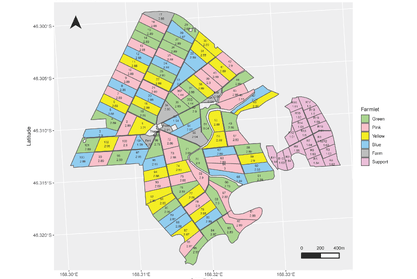Farm Information
The Farm
Farm Area
Milking platform: 299 ha
Support Block: 39 ha
Unproductive land: 2 ha
Milking infrastructure
60 bale rotary dairy with DeLaval plant and Delpro Herd Management software
Automatic cup removers and on-platform teat spray, Automatic drafting and weighing
Greenwash on the backing gate
Climate
Mean Annual Maximum Temperature - 17.7 oC
Mean Annual Minimum Temperature - 5.4 oC
Average Annual Soil Temperature – 11.0 oC
Average Annual Rainfall – 785.4 mm
Soil Types
Table 4: Soil types, locations and characteristics on farm
Soil type | Location | Characteristics |
Edendale | Top terrace | Well drained, high WHC, seldom dries out |
Pukemutu | Through centre of farm | Poorly drained due to sub surface pan between 600 and 900 mm deep. Vulnerable to waterlogging. |
Makarewa | Bottom terrace | Poor aeration during wet periods due to poor sub surface drainage and slow permeability. Severely vulnerable to waterlogging in wet periods. |
Staffing and management
Roster System – Year-round 8 on 2 off, 8 on 3 off
Milking Times – cups on at 5 am / 2.30 pm
Effluent System
Two receiving ponds with weeping walls, leading into a storage pond. Effluent applied by travelling irrigator. Solids cleared out November 2018. Some effluent applied by umbilical system in March 2019. Greenwash on the backing gate
Herd Details
Table 5: BW and PW as of 26 February 2023
|
| BW | PW |
Pink – Std Swede/Baleage | Cows (230) | 202 | 253 |
Blue – LI Baleage | Cows (141) | 205 | 258 |
Green - Std FB | Cows (230) | 203 | 254 |
Yellow – LI Kale | Cows (141) | 217 | 271 |
Grouped | Yearlings | 275 | 286 |
Farmlet Map
SDH Biosecurity Policy
Biosecurity is an important obligation for all visitors, please follow all instructions for the protection of SDH as a business and for protection of the research investments in place.
· All visitors that come on farm must have clean clothing along with clean covered in footwear
· Any visitor that has been on a property with a confirmed biosecurity incident must get permission to enter from either the farm or business manager.
· All visitors on farm must move through the biosecurity area at the shed. Footwear to be cleaned if need be with the scrubbing brush supplied then disinfected in the footbath. Non-waterproof footwear is to be disinfected via the walk-through sponge mat.
· No visitor access, under any circumstances from anyone within 5 days of their arrival in New Zealand from Central or South America, or any part of Asia. Further restrictions may be applied at any time dependent upon country of origin and international disease status.
· All visitor vehicles are to remain in the parking area and may not travel over the farm without permission of the tour leader or farm manager.

